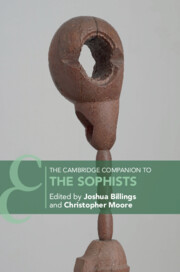Book contents
- The Cambridge Companion to the Sophists
- Other Volumes in the Series of Cambridge Companions
- The Cambridge Companion to the Sophists
- Copyright page
- Contents
- Contributors
- Note on the Text
- Introduction
- Part I Contexts
- Part II Thought
- Part III Receptions
- 12 The Fourth-Century Creative Reception of the Sophists
- 13 Writing the First Sophistic
- 14 The Sophists in the History of Philosophy
- Appendix: The People of the Sophistic Period
- Select Bibliography
- Index
- OTHER VOLUMES IN THE SERIES OF CAMBRIDGE COMPANIONS (continued from page ii)
14 - The Sophists in the History of Philosophy
from Part III - Receptions
Published online by Cambridge University Press: 23 December 2023
- The Cambridge Companion to the Sophists
- Other Volumes in the Series of Cambridge Companions
- The Cambridge Companion to the Sophists
- Copyright page
- Contents
- Contributors
- Note on the Text
- Introduction
- Part I Contexts
- Part II Thought
- Part III Receptions
- 12 The Fourth-Century Creative Reception of the Sophists
- 13 Writing the First Sophistic
- 14 The Sophists in the History of Philosophy
- Appendix: The People of the Sophistic Period
- Select Bibliography
- Index
- OTHER VOLUMES IN THE SERIES OF CAMBRIDGE COMPANIONS (continued from page ii)
Summary
This chapter traces the modern reception of the Sophists from their rediscovery in the Latin West to the first edition of Hermann Diels’ Die Fragmente der Vorsokratiker (1903). Its focus is the Sophists’ uncertain place in the historiography of Greek philosophy, in relation both to the “Presocratics” and to Socrates and the Socratic tradition. The “Sophists” emerge as an historiographical category in the late eighteenth century and become pivotal in Georg Wilhelm Friedrich Hegel’s (1770–1831) systematic account of philosophy’s development. Eduard Zeller (1814–1908), his key successor, revises but also reinforces the still dominant Hegelian narrative. The chapter also discusses two outsiders to the German historiographical tradition, George Grote (1794–1871) and Friedrich Nietzsche (1844–1900), who challenge the Sophists’ assimilation to progressivist views of Greek philosophy, but from radically different perspectives.
- Type
- Chapter
- Information
- The Cambridge Companion to the Sophists , pp. 403 - 437Publisher: Cambridge University PressPrint publication year: 2023

